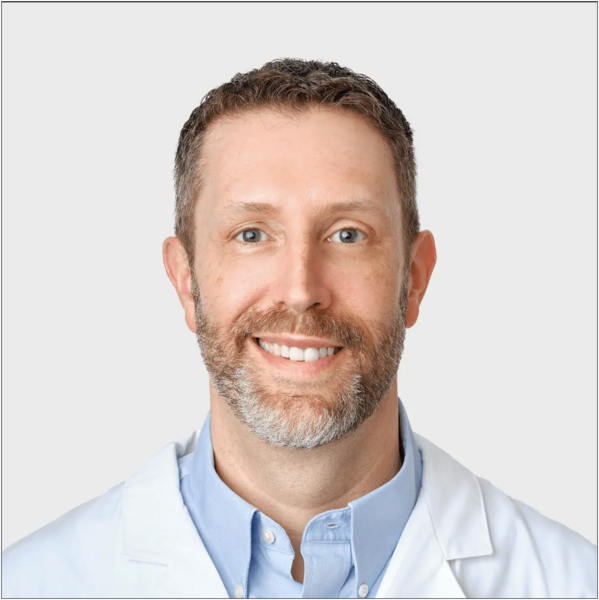Dr. Schwartz, an orthopedic surgeon, shares his journey from the operating room to the executive suite as SVP of Care Services and Strategy at Commons Clinic. In this conversation, he reflects on building a nonclinical career through networking, adaptability, and continuous learning—while debunking common myths about leaving medicine. His story highlights how clinical discipline and curiosity can translate into leadership, innovation, and impact in the startup world.
1. Day-to-Day
• What does a typical day look like for you as SVP of Care Services and Strategy at Commons Clinic?
It's a hybrid role where I mostly work from home but travel on site (from Boston to LA!) once or twice a quarter. Startup life means that the work is constantly shifting, but in general I help lead our clinical programs, provide input on strategy, participate in investor calls, engage in thought leadership (blog, social media posts), and give input on our AI tool.
Some days are filled with Zoom calls while others are spent putting together frameworks in Google docs, writing Substack articles, and testing a new feature for CommonsAI. I spend a lot of time in Slack communicating with various team members and continue to network through e-mail and LinkedIn.
When I'm on site, it's a mix of meeting with the in-market operation and exec team, getting some face time with Commons' physicians and leading our Physician Advisory Committee meeting. I pitch in with recruiting and community outreach efforts when needed which usually means a dinner or event at a Commons location.
2. Career Transition
• Once you decided to explore nonclinical opportunities, what were the first steps you took?
The first step really was to build a network. As a community Orthopedic Surgeon, I didn't have a lot of exposure to innovation, entrepreneurship, investing, advisory work, etc. in my normal day-to-day. LinkedIn was helpful in that regard. I just started posting about stuff I found interesting, sharing opinions, and commenting on others' posts. From there I served as an advisor for incubators and accelerators like MATTER, Plug and Play, MIT Hacking Medicine, and a few others. I had a lot of conversations, some based on warm intros and others based on cold messaging. Based on some advice, I began to make small angel investments in startups as a way to get involved, learn more about entrepreneurship, and surface more opportunities.
• Did anyone help guide you through the process or open doors along the way?
There are a number of people who helped open doors for me or were willing to have a conversation based on a cold message, too many to name them all. However, Uli Chettipally, a Kaiser ER doc turned founder turned entrepreneur, was especially gracious with his time and advice. There are several communities of physician entrepreneurs like Health Tech Nerds, X = Primary Care, MDisrupt, and others that are very supportive of physicians interested in non-clinical roles. There's also a robust physician presence on LinkedIn that includes founders, people who have made the transition into non-clinical roles, and docs interested in health tech.
3. Preparation and Education
• Did you pursue any additional education or training to prepare for the transition?
I decided to pursue an MBA to gain some basic knowledge of business concepts both in my practice (I became part owner in an ASC and my practice was considering a sale to private equity) and in my side gig pursuits. I also found platforms like Coursera helpful to fill in gaps in an easily digestible, self-paced format. Curating a network on social media and joining healthcare innovation communities was also a great way to learn. There are several sources of curated healthcare articles like Rama On Healthcare, the HTN Weekly Newsletter, and Google Alerts.
• How useful did you find your MBA in bridging the gap between clinical practice and executive leadership?
Moderately. I don't think an MBA is required by any means, nor is getting the degree an unlock
to a non-clinical career. Honestly, I'm not sure most people care if you have an MBA. Of course, like many things related to higher education, I suppose having an MBA from a big-name institution looks good on a slide deck. However, I'd be cautious with any company views a physician executive as a figurehead. TL;DR — get an MBA to gain a better understanding of business and leadership, not as an expensive networking/resume building tool. Real world experience > degree accumulation.
4. Habits and Mindset
• What habits or mindsets from surgery have served you well in your leadership role?
Adaptability for sure. The trope is that physicians in general, and surgeons specifically, don't do well with uncertainty. Yes, we like routine and predictability, but being a surgeon is all about having a Plan B, Plan C, and Plan D and quickly adapting to the unforeseen. I also think most surgeons are pretty driven and perfectionistic. Not necessarily Type A, but dedicated to their craft and constant self-improvement. It takes a lot of self-discipline and a constant curiosity to succeed as a surgeon, and being at a startup is no different. From a leadership perspective, as a surgeon you are the captain of the ship in the OR. One of the biggest lessons I learned in the OR was how to motivate people and lead by example — show up on time, treat everyone with respect, commit to doing a good job, learn how to read the room, know when to praise and when to course correct. Every surgeon is a team leader, but some are better at it than others.
• On the flip side, which aspects of the surgical mindset did you have to unlearn to succeed in a nonclinical environment?
There's certainly less structure in a startup environment. As a joint replacement surgeon, my day-to-day became very predictable (which is part of the reason I opted to make the transition). Now, my day-to-day is less predictable. I might be working on one thing and get pulled into something else. The feedback and gratification in the startup world are less immediate than performing a surgery. As physicians and surgeons our bias is to be more cautious while the startup world is all about a bias toward action. Working at an early-stage startup has been compared to building the play while you're trying to fly it. A lot of our medical training is to do a 30 point safety check before taking off.
5. Networking and Career Growth
• Physicians are often told that networking is key to a successful transition. What kind of networking actually moves the needle?
Find a community (like any of the ones mentioned above). Networking is more of an art than a science. Early on, you may have 1 fruitful conversation for every 4 conversations that are low yield. But I think it's helpful early on to be open to connecting without necessarily needing something in return. Your time is valuable and over time you will figure out which connections are worth pursuing. Social media is a double-edged sword but can be helpful. Be intentional but respectful with cold messaging. Comment on posts/topics of interest and try to add something of value to the conversation.
• Any actionable tips for physicians especially those who are uncomfortable with self-promotion or reaching out?
Bring people to you. Start posting on topics of interest, share an interesting opinion or perspective based on your own experience, focus on quality over quantity. Start by commenting. IMO, blatant self-promotion always falls a little flat and feels a little hollow. That doesn't mean you can't, shouldn't, or won't build a brand — but it should be organic and authentic. Someone once suggested your ratio of self-promotional posts to thought pieces should be like 1:4 or 1:5 and that feels about right. I also happen to think if you start a post with I'm humbled and honored
followed by some award, promotion, or recognition, you are neither humbled nor honored! It's great to share your successes, no need to be self-deprecating, but tie them into a deeper message. Starting a blog or newsletter can be both cathartic and a great way to network. It doesn't matter if only 5 people read it, one of those 5 people might become a treasured mentor!
True story — my current role began with a cold message based on stuff I was posting/writing about. I can't remember if Commons' founder reached out to me or vice versa, but we had a great initial conversation, I ended up eventually investing in the company, we kept in contact periodically, and 4 years later, I joined the company full time.
6. Misconceptions and Realities
• What are the most common misconceptions you see among surgeons considering nonclinical careers?
I think it's very individual specific. One of the biggest worries is that you will lose your identity. I didn't feel that way at all maybe because I felt being a surgeon was a byproduct of who I was instead of the inverse. Some may feel differently, but the right nonclinical role can be every bit as rewarding, challenging, and self-affirming as being a surgeon. Not everyone will understand your reasons behind making the transition, and that's OK. However, I do caution people about running towards something rather than running away from it.
• Do surgeons typically need to expect a significant pay cut—or is that not always the case?
Obviously, it depends somewhat on the type of surgeon, surgical practice, and nonclinical role. But yes, most surgeons should expect a pay cut, perhaps a significant one. Some roles in more established companies may come with less of a pay cut, but the upside is also typically lower. Early-stage startups are often very mindful of their cash burn and often offer equity in lieu of a higher salary. The upside is higher but so is the risk. As the company grows, there is opportunity for salary increases, bonuses, equity refreshes, new titles and responsibilities, etc. It's a little different than surgeon compensation. Figuring out the financial side of it was critical for me. A lot of time and effort went into de-risking the transition financially. Someday I'll write a post on it!
7. Rapid Fire
• A book or podcast that shaped your thinking recently?
Relentless Health Value (podcast), The 7 Powers by Hamilton Helmer (book)
• A skill every physician should learn early?
Growth mindset. We're naturally critical and skeptical (and we should be). But we shouldn't let that close our minds to innovation or outsiders' perspectives.

